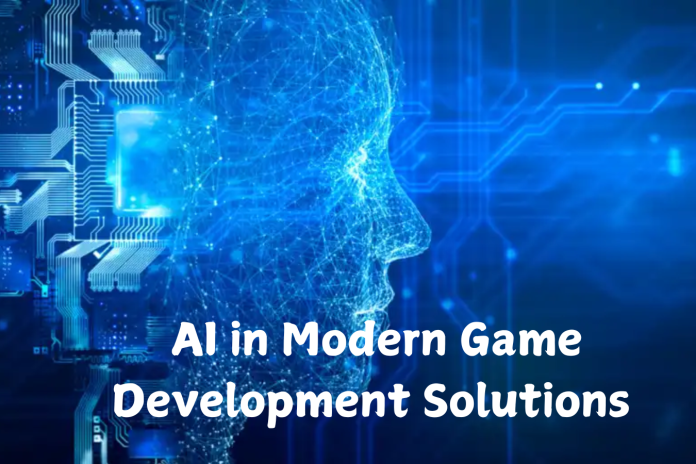Artificial intelligence (AI) is no longer a futuristic fantasy; it’s a powerful and pervasive force transforming industries across the board, and the game development world is no exception. AI is revolutionizing how games are created, played, and experienced, offering developers unprecedented tools to craft more immersive, dynamic, and engaging worlds. This blog explores the crucial role of AI in modern game development solutions, highlighting its diverse applications and the exciting possibilities it unlocks.
Enhancing Non-Player Characters (NPCs)
One of the most visible applications of AI in game development is the creation of more believable and dynamic Non-Player Characters (NPCs). Traditional scripted behaviors often make NPCs feel robotic and predictable. AI-powered NPCs, on the other hand, can:
- Exhibit More Realistic Behaviors: AI allows NPCs to react to player actions and the game environment in a more natural and believable way. They can make their own decisions, learn from past interactions, and even develop distinct personalities.
- Offer Dynamic Challenges: AI can adjust the difficulty and behavior of NPCs based on the player’s skill level, creating a more challenging and engaging experience.
- Create More Immersive Worlds: By populating game worlds with intelligent and believable NPCs, developers can create a greater sense of immersion and make the game world feel more alive.
Also read our blog on how to make a car game? and learn in-depth process of car game development.
Creating Dynamic and Responsive Game Worlds
AI is not just about intelligent characters; it can also be used to create dynamic and responsive game environments.
- Procedural Content Generation: AI algorithms can generate vast amounts of game content, such as landscapes, dungeons, and even storylines, saving developers significant time and resources. This allows for the creation of larger and more diverse game worlds.
- Adaptive Difficulty: AI can analyze player behavior and adjust the game’s difficulty in real-time, providing a personalized challenge that keeps players engaged without becoming frustrated.
- Realistic Physics and Simulations: AI can be used to simulate realistic physics, weather patterns, and other environmental effects, adding another layer of immersion to the game world.
Improving Game Design and Development
AI is also playing an increasingly important role in the game design and development process itself.
- Automated Testing: AI can be used to automate game testing, identifying bugs and glitches more efficiently than traditional methods. This helps to improve the quality of the final product and reduce development time.
- Game Balancing: AI can analyze player data and identify imbalances in gameplay mechanics, helping developers to fine-tune game parameters and ensure a fair and enjoyable experience.
- Predictive Analytics: AI can be used to analyze player behavior and predict future trends, helping developers to make informed decisions about game design and marketing.
AI-Powered Game Mechanics
AI is not just used behind the scenes; it can also be integrated directly into gameplay mechanics.
- Intelligent Enemies: AI can create enemies that adapt to player tactics and employ different strategies, making combat more challenging and engaging.
- Cooperative AI: AI can be used to create intelligent allies that can assist the player in combat or solve puzzles, enhancing the cooperative gameplay experience.
- Emergent Gameplay: AI can create unexpected and emergent gameplay moments, adding a layer of unpredictability and excitement to the game.
The Future of AI in Game Development
The future of AI in game development is full of exciting possibilities. As AI technology continues to advance, we can expect to see even more innovative applications in the years to come.
- Personalized Game Experiences: AI could be used to create truly personalized game experiences, tailoring the story, gameplay, and even the game world to individual player preferences.
- AI-Driven Storytelling: AI could be used to create dynamic and branching narratives, where player choices have a significant impact on the story’s outcome.
- Enhanced Realism: AI could be used to create even more realistic and believable game worlds, blurring the lines between virtuality and reality.
The Role of Game Development Solutions
As AI becomes more integral to game development, game development services are adapting to incorporate AI expertise into their offerings. These services can help developers integrate AI into their projects, from designing intelligent NPCs to implementing AI-powered game mechanics. Their expertise can be invaluable in navigating the complexities of AI development and ensuring that AI is used effectively to enhance the game experience.
Challenges and Considerations
While AI offers many benefits, there are also challenges to consider:
- Cost: Developing AI-powered game features can be expensive, requiring specialized expertise and resources.
- Complexity: Integrating AI into game development can be complex, requiring careful planning and execution.
- Ethical Considerations: As AI becomes more sophisticated, there are ethical considerations to address, such as ensuring fairness and preventing bias in AI algorithms.
Conclusion
Artificial intelligence is transforming the game development landscape, empowering developers to create more immersive, dynamic, and engaging gaming experiences. From enhancing NPCs and creating responsive game worlds to improving game design and enabling innovative game mechanics, AI is playing a crucial role in shaping the future of interactive entertainment. While challenges remain, the potential benefits of AI in game development are undeniable. As AI technology continues to evolve, we can expect to see even more exciting and innovative applications in the years to come, further blurring the lines between reality and virtuality and ushering in a new era of gaming. The partnership between human creativity and artificial intelligence promises to unlock unprecedented possibilities, pushing the boundaries of what’s possible in the world of games and creating truly unforgettable experiences for players.



